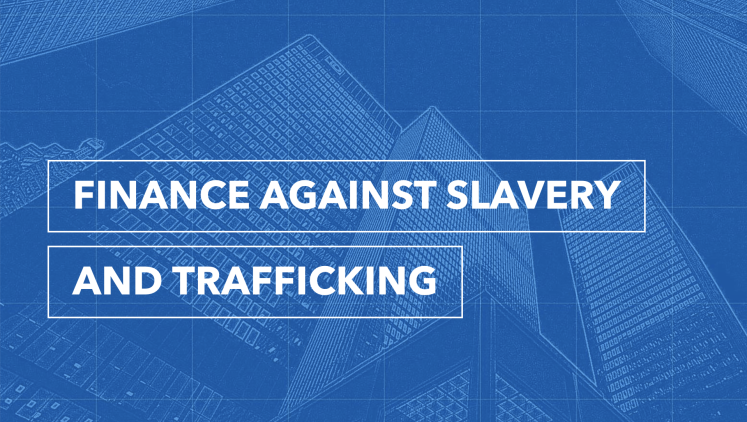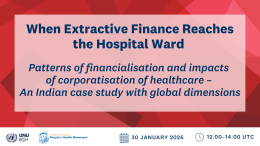UNU-CPR’s signature anti-modern slavery initiative, Finance Against Slavery and Trafficking (FAST), will transition to the United Nations Development Programme (UNDP) later this summer to build on the foundational concepts and research carried out at UNU-CPR and strengthen strategic engagement with the financial sector.
The move follows five successful years at UNU-CPR where the FAST initiative emerged as a leading resource for advocates shaping conversations about the critical role finance can play in combating modern slavery: providing rigorous analysis, evidence-based approaches, and tailored tools and training.
UNDP’s extensive in-country networks, expertise, and profile offer significant opportunities for further expansion as the modern slavery challenge worsens. The latest available figures suggest that the number of people estimated to be living in conditions of modern slavery on any given day in 2021 was 49.6 million, an increase of about 20 per cent over 2017. The increase is due to a combination of factors that include the climate crisis, prolonged conflicts, and the lingering effects of the COVID-19 pandemic.
Since the launch of its "Blueprint" in 2019, the FAST initiative has consolidated a team of experts who built a global network of anti-slavery allies across governments, the financial sector, and civil society; developed an extensive evidence base on actions the financial sector can take to identify illicit proceeds of human exploitation; developed financial inclusion practices to empower survivors of modern slavery; and helped improve the capacities of investors, anti-money laundering professionals, government officials, and financial service providers. The project also developed and promoted new research on financial interventions for vulnerable populations and explored new frontiers of vulnerability emerging from conflict and crisis.
Informed by this research, FAST’s resources and presentations have reached nearly 130,000 financial industry professionals worldwide. The initiative’s free courses, developed in partnership with the Association of Certified Anti-Money Laundering Specialists (ACAMS), have been completed by over 55,000 anti-money laundering professionals.
Additionally, FAST has served as a knowledge partner to investor coalitions with a combined $27 trillion in assets under management. In recent years, the initiative has seen more States develop regulations and legislation addressing the role of the financial sector in ending modern slavery, signaling a remarkable shift in momentum towards achieving SDG Target 8.7.
Crucially, FAST also worked in partnership with survivors of modern slavery, building their insights into policies and programming, ensuring their needs are reflected in inclusive financial access practices, and positioning them as leading advocates in the financial sector’s fight against modern slavery. The project’s Survivor Inclusion Initiative facilitated financial access for nearly 4,500 survivors, and its lessons have been successfully applied to other vulnerable populations such as refugees.
"UNU-CPR was the ideal home for FAST during its initial growth," says Alice Eckstein, Project Director of the FAST initiative. "As an incubator of new ideas and policy solutions, UNU-CPR helped FAST adopt its innovative approach to the modern slavery challenge – combining expert analysis, practical guidance, and targeted outreach. I’d like to take this opportunity to thank all of our partners who have contributed to FAST’s success over the past five years – and I look forward to more engagement in our new home at UNDP."
"FAST’s reach and networks have grown impressively since 2019. By leveraging UNDP’s global network of in-country offices and talent pool, the initiative will be able to target a larger and more diverse group of people," says David Passarelli, Director of UNU-CPR. "UNDP’s expertise and enthusiasm for this work will accelerate engagement with the financial sector and survivors as the FAST initiative enters a new, third phase."
FAST will integrate with the Sustainable Finance Hub, UNDP’s global effort to accelerate financing for the SDGs. The initiative will also benefit from UNDP’s extensive financial, business, and sustainable development expertise; access to investors; and South-South exchanges and horizontal knowledge-sharing on sustainable finance practices.
FAST will be implemented in coordination with the Global Business and Human Rights (B+HR) Initiative that leads UNDP’s work on ending business-related modern slavery and human trafficking. With the existing national expertise, contextualized knowledge, and access to local language data on B+HR, as well as grassroots networks with affected rights-holders, including survivors of modern slavery and human trafficking, across 42 countries, the Global B+HR Initiative will facilitate the building of ideas and policy solutions incubated by UNU-CPR into development programming at the field level.
"In taking this important step, we are grateful to UNU-CPR for developing this unique and fast-growing initiative which has contributed to mobilizing the finance sector to combat modern slavery. We are committed to leveraging UNDP's extensive country presence and expertise in sustainable finance and human rights to champion this work," says Thomas Beloe, Director of UNDP's Sustainable Finance Hub. "Together, we will continue to expand the reach and impact of FAST, furthering our collective efforts towards achieving the Sustainable Development Goals."
Partners critical to FAST’s success over the past five years remain committed to the initiative’s mission. "We are excited to move ahead with the next phase of FAST, Liechtenstein’s flagship SDG project, and would like to express our deep gratitude to UNU-CPR. We have developed FAST together in an innovative format that reflects the philosophy of the 2030 Agenda and culminated in the launch of the Blueprint and then a period of implementation, with impressive and high-quality outcomes," added Ambassador Christian Wenaweser, Permanent Representative of Liechtenstein to the United Nations in New York. "We also very much look forward to the partnership with UNDP, with its unique access and opportunities for implementation in the field. We are confident that together we will be able to further expand the reach of and the support for FAST."
FAST’s transition to UNDP will be announced on July 8 at an event co-organized by UNU-CPR and UNDP during the United Nations High-Level Political Forum on Sustainable Development.




